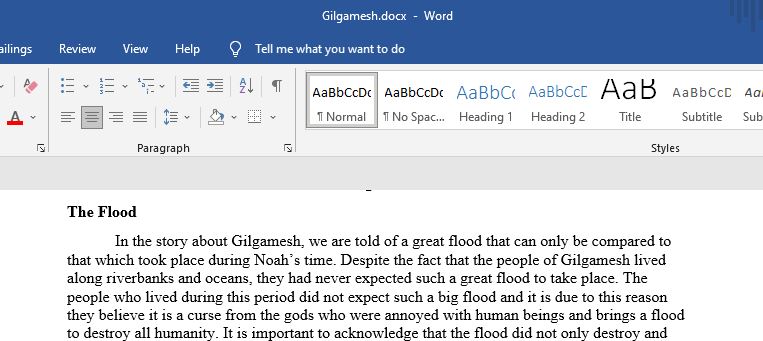Gilgamesh
Gilgamesh remains a compelling narrative, and the plot devices and character types remain part and parcel of nearly every heroic story we might read from The Iliad to Harry Potter.
We will begin our literary analysis here, so please read the complete entry in Part One of the course Anthology (Links to an external site.)Links to an external site..
Assignments: Gilgamesh
Please progress through this module as follows:
Read:
• The Epic of Gilgamesh in the Anthology (Links to an external site.)Links to an external site..
The Flood
Starting at Lines 785, p. 93 of the PDF, we encounter one of the first flood narratives in recorded history; why do you think imagery of a flood–seen perhaps more famously in modern America through Noah’s story in the Old Testament–were so powerful and pervasive for people living in the ancient world? Think that most civilizations grew up around rivers and oceans where floods and tidal events were among their greatest dangers and fears.
What details in Utnapishtim’s tale sticks out to you, especially knowing that the Hebrew Bible would be composed/constructed from earlier texts centuries later?
In Greek Mythology (which came well after Mesopotamian stories and cultures were developed from them as well as Egyptian and other sources), the god Poseidon was given dominion over of the oceans, the tides, tsunamis/tidal waves, and earthquakes and the people feared him nearly as much as they feared Zeus, Poseidon’s brother and King of the Gods–how might we see mythic figures Poseidon (or Neptune as the Romans would call him) as following from such stories as this one in Gilgamesh?
The Return Home:
For nearly all epic heroes, the return home is an important element in the conclusion of the journey (or journeys) undertaken in the story)–Gilgamesh goes back home starting at line 1024, p. 207 of the PDF–why is this important to the story? What has he learned? What does he accept that he didn’t at first?
Look especially at the idea of Gilgamesh being given the gift of immortality as a plant–Urshanabi tells him that he can remain young forever, and Gilgamesh intends to bring it back to Uruk and cultivate it for all others–how has he changed from the start of the poem?
That the poem has a serpent take the plant–does this remind you of another story? How do both stories use so many people’s seemingly primordial, instinctual fear of and revulsion to snakes?
What have we learned through reading this poem? What does it hold for us as readers in 2018?
Femininity in Gilgamesh
Think about what the story suggests about the role(s) of and for women–the harlot is sent to tempt and temper Enkidu and make him more man than beast.
What does this mean for the image of ‘woman’ in this text?
What are your thoughts on this image as well as images of femininity in the poem?
Further, how can we see images of women and goddesses in the poem as setting up patterns we can see in later sacred and other texts? Examples of femininity in more modern texts that you can trace back to Gilgamesh?
Gilgamesh and Enkidu as Characters
What do you make of the character of Gilgamesh–is he good person? Would you like to know him? Why or why not?
From the start of the poem, what do we learn about him–especially as both a man and a ruler? is he a good character? Would you want to live under his leadership?
What drives Gilgamesh at different points in his story?
How does Enkidu figure as a character in Gilgamesh’s story?
Can we see them as the father-figures (if you will) of so many “buddies” in other texts all the way to today’s characters such as Batman and Robin, Han Solo and Chewbacca, the ‘Bridesmaids,’ the ‘Hangover’ gang, and other groups in contemporary media?
The Gods
What do you make of the Gods as depicted in this work?
How do they differ from the Gods in Greek or Roman myths you might know (Zeus/Jupiter, Athena/Minerva, e.g.) or the God of Abraham (sometimes just referred to as ‘God’ or Yahweh/YWWH)?
What makes them seem more human, shall we say, than the God of Abraham, and what do you think that the Mesopotamians thought about their Gods?
Early in the poem, starting at line 24, we can see a little of the relationship of the people and the gods, especially with regard to Gilgamesh himself–how would you describe the relationship the people have towards their gods? Does it seem different from how contemporary Jews, Christians, Muslims, et. al. see themselves and their God? What do you make of this?
Why Does Gilgamesh Persist?
It is based, all historical evidence suggests, on a living king from the 27th Century B.C.E. (‘Before Christian or Before Common Era’ depending on who you ask–I prefer ‘Common Era’ myself) or ~5000 years ago.
The story was written in cuneiform on tablets that were created ~2700 years ago in the 7th Century BCE.
Gilgamesh, though we have it as a prose narrative, is the first epic poem in recorded literature, and the epic, while under great changes in the last 27 centuries remains one of the most popular story forms in all Western culture–the Harry Potter series is one of the most recent examples and borrows many elements directly from Gilgamesh–e.g. a chosen hero with superior abilities, great friends who aid him in times of trouble, meetings with monsters, quests for immortality, etc. So, why does Gilgamesh still reward readers?
What do you like in the work?
What doesn’t work for you?
this is link:https://ung.edu/university-press/books/compact-anthology-world-literature.php
Answer preview:

Words:1250
